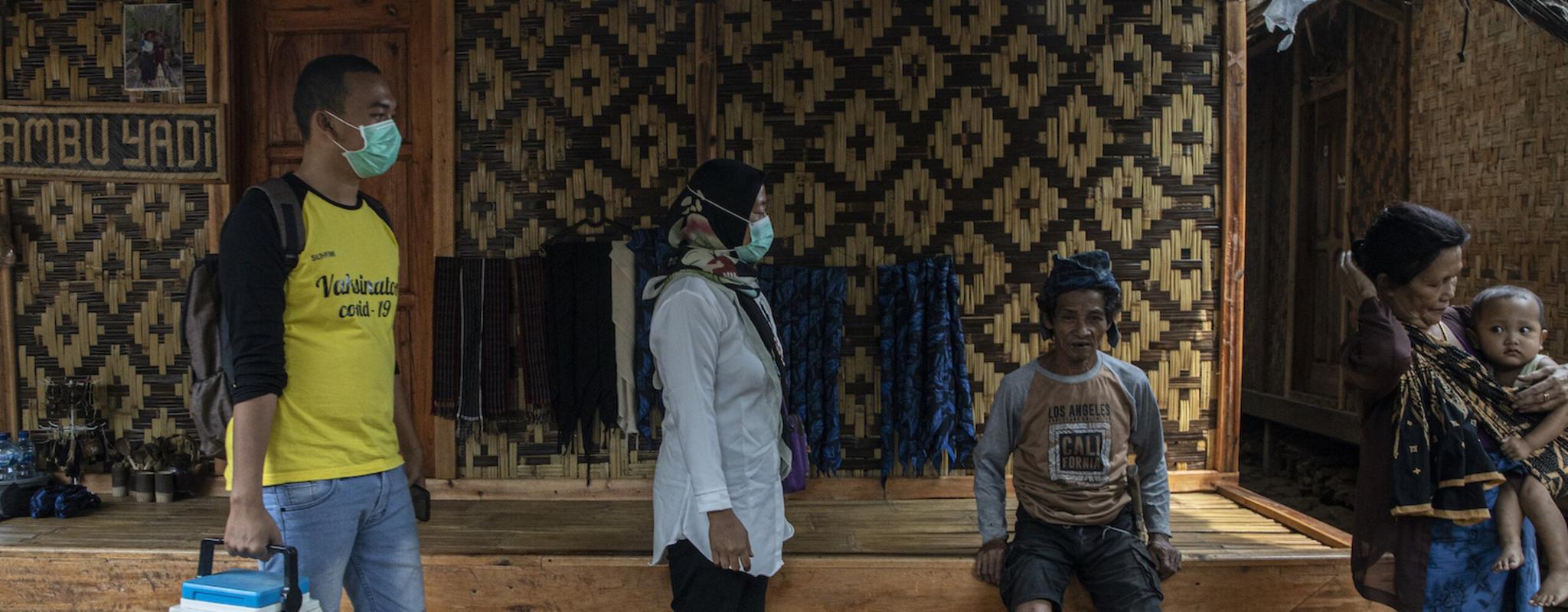Chapter 2: Public support for global spending on preventing and curing diseases
This is the second chapter of the Wellcome Global Monitor 2020: Covid-19
As with other problems, such as climate change, the Covid-19 crisis has highlighted the need for international cooperation to prevent and mitigate threats that affect the entire global population1. The pandemic has shown how easily a virus can spread in a world where modern transportation allows people to routinely travel between countries and regions, as well as how broadly the health and economic effects of poor preparedness can be felt worldwide.
Some development and financing experts, including the High Level Independent Panel (HLIP) on financing the global commons for pandemic preparedness and response established by the G20 in January 20212,3, have called for new governance mechanisms and pooled international financing for global problems like pandemics. Policy analysts have argued that pandemic preparedness constitutes a ‘global public good’4 – that is, a cross-border effort that contributes to health progress but is not adequately produced by market forces – and that new arrangements for providing global public goods in health are necessary5,6,7,8.
In view of the need for international coordination in response to global-level crises like Covid-19, the Wellcome Global Monitor tested people’s support for their country’s participation in international efforts by asking about the extent to which they agreed with the following two statements:
- After the Covid-19 crisis ends, the government of [this country] should spend money to help other countries prevent and cure diseases wherever they occur.
- After the Covid-19 crisis ends, the government of [this country] should spend money on preventing and curing diseases only if they pose a risk to people in this country.
As Chart 2.1 reveals, at least 70% of people who answered this question worldwide strongly or somewhat agreed with each item, despite these two opinions, ostensibly at least, contradicting each other. This finding suggests that some people either weren’t aware that the statements were mutually exclusive or may not have been comfortable choosing one option over the other.
Chart 2.1: Views on government spending to prevent and cure diseases, global results
Percentage of people who strongly agreed, somewhat agreed, somewhat disagreed or strongly disagreed.
For each statement, please tell me whether you strongly agree, somewhat agree, somewhat disagree, or strongly disagree.
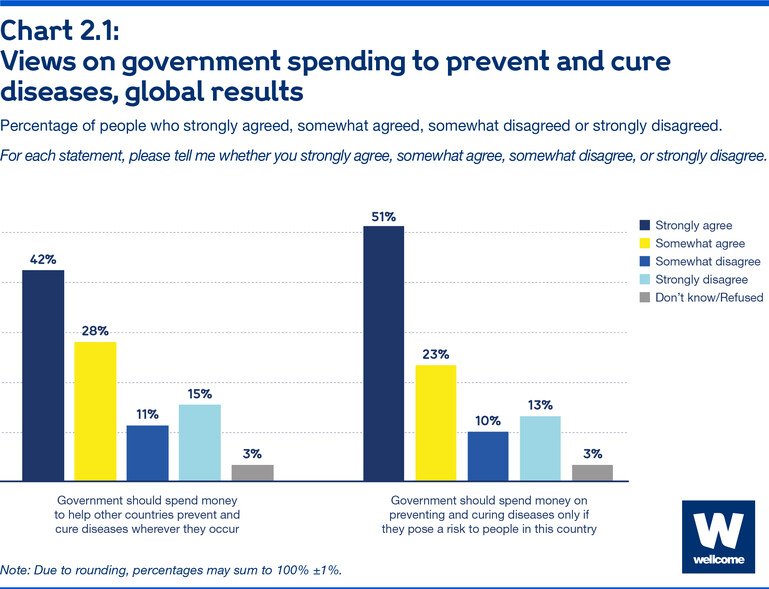
In some regions, including South Asia*, East Asia and Latin America, strong majorities agreed with both statements. For example, while people in South Asia and East Asia were among the most likely to agree that their respective government should spend money to prevent diseases wherever they occur (Chart 2.2), more than three-fifths in both regions also said that their governments should spend money on combatting diseases that only pose a threat to their own country (Chart 2.4).
In other regions, public sentiment leaned more in one direction or the other. Western Europe, Australia/New Zealand and Northern America – high-income regions that include more traditional ‘donor’ countries** – were among those where people were more likely to say that their government should help wherever needed than they were to say that their government should help only if diseases pose a risk to their population.
*It should be noted that data collection in South Asia took place well before the massive surge in Covid-19 cases that took place in much of the region during the spring of 2021.
**Defined as countries that contribute the most in official development assistance. See: Aid by DAC members increases in 2019 with more aid to the poorest countries. (2020, April 16). OECD – Paris. https://www.oecd.org/dac/financing-sustainable-development/development-finance-data/ODA-2019-detailed-summary.pdf
Chart 2.2: Views on government spending to prevent and cure diseases wherever they occur, by region
Percentage of people who strongly agreed, somewhat agreed, somewhat disagreed or strongly disagreed.
For each statement (statement 1 of 2), please tell me whether you strongly agree, somewhat agree, somewhat disagree, or strongly disagree: After the Covid-19 crisis ends, the government of [this country] should spend money to help other countries prevent and cure diseases wherever they occur.
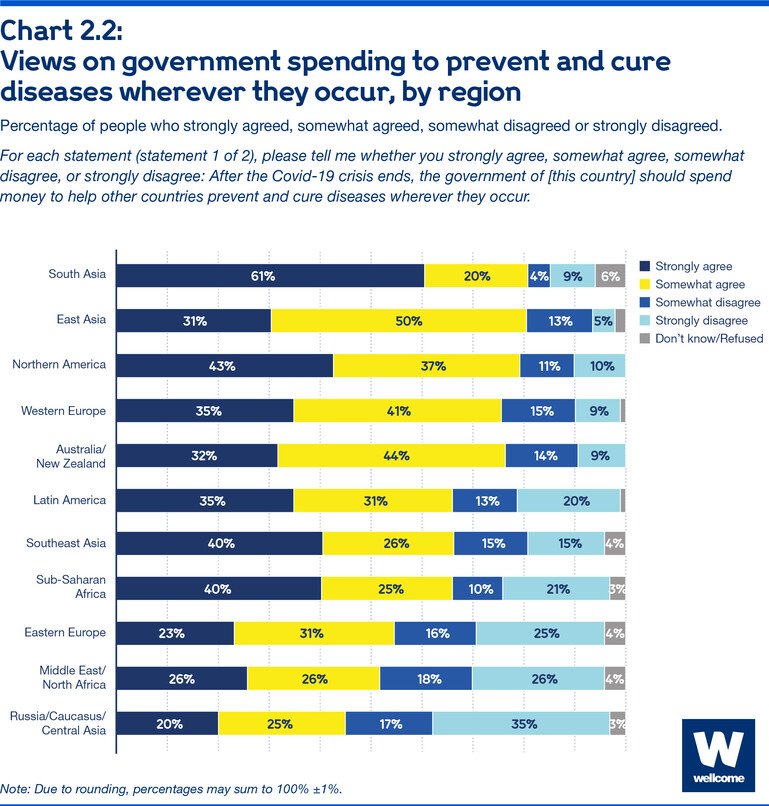
In 13 countries within Northern America, Western Europe and Australia/New Zealand, the percentage who agreed that their government should spend money fighting diseases regardless of where those diseases occur was more than 10 points higher than the percentage who agreed that their government should spend money only if the disease threatens their country (Chart 2.3).
Chart 2.3: Countries where people were more likely to say that the government should fight diseases wherever they occur compared to that the government should fight diseases only if they pose a risk to that country
Percentage of people who strongly/somewhat agreed with each statement among countries with at least a 10-percentage-point gap in agreement.
For each statement (statement 2 of 2), please tell me whether you strongly agree, somewhat agree, somewhat disagree, or strongly disagree.
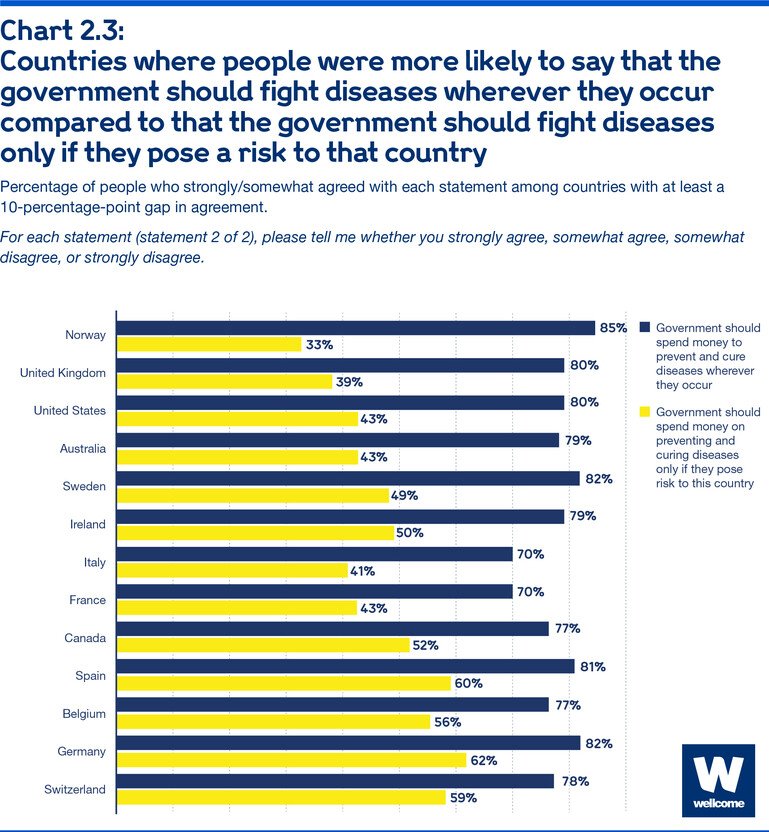
As shown in Chart 2.4, people in Northern America, Western Europe and Australia/New Zealand were the least likely to say that their government should help prevent and cure diseases only if they pose a threat to people in their country. By contrast, people in Southeast Asia, the Middle East/North Africa and Russia/Caucasus/Central Asia regions were considerably more likely to agree with this second statement in the survey than they were to agree with the first.
Chart 2.4: Views on government spending to prevent and cure diseases only if they pose a risk to that country, by region
Percentage of people who strongly agreed, somewhat agreed, somewhat disagreed or strongly disagreed.
For each statement (statement 1 of 2), please tell me whether you strongly agree, somewhat agree, somewhat disagree, or strongly disagree: After the Covid-19 crisis ends, the government of [this country] should spend money on preventing and curing diseases only if they pose a risk to people in this country.
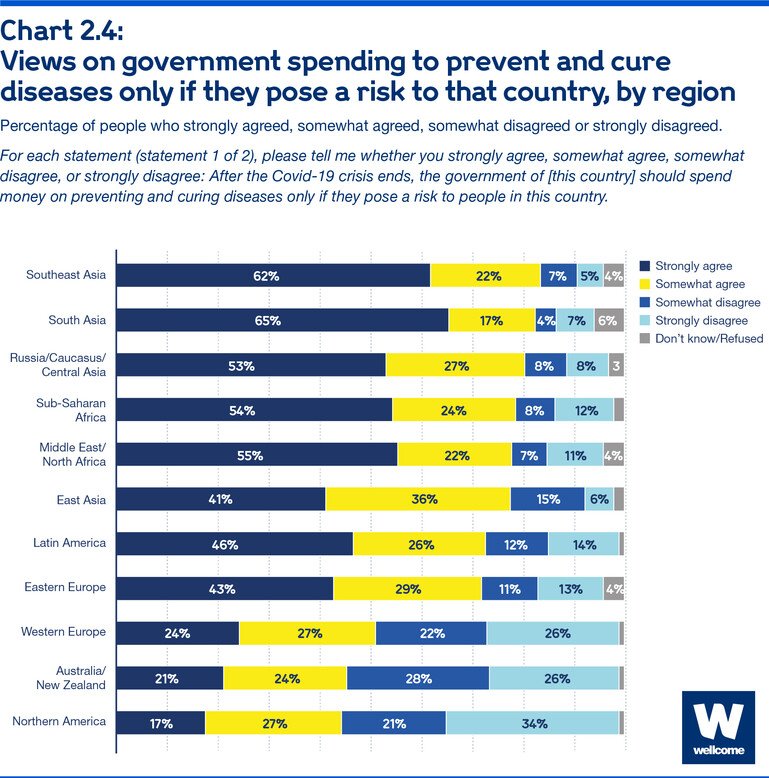
In 13 countries, the percentage who agreed that their government should only spend money on diseases that pose a risk to their country was at least 25 points higher than the percentage who agreed that their government should spend money to help prevent or cure diseases wherever they occur (Chart 2.5). Notably, most of these are middle-income countries* that typically focus on national priorities and development and not on development assistance to other countries.
*All except Latvia are upper-middle-income or lower-middle- income countries. See: World Bank country and lending groups | Data. (n.d.). The World Bank. https://datahelpdesk.worldbank.org/knowledgebase/articles/906519-world-bank-country-and-lending-groups
Chart 2.5: Countries where people were more likely to say that the government should fight diseases only if they pose a risk to that country compared to that the government should fight diseases wherever they occur
Percentage of people who strongly/somewhat agreed with each statement among countries with at least a 25-percentage-point gap in agreement.
For each statement (statement 2 of 2), please tell me whether you strongly agree, somewhat agree, somewhat disagree, or strongly disagree.
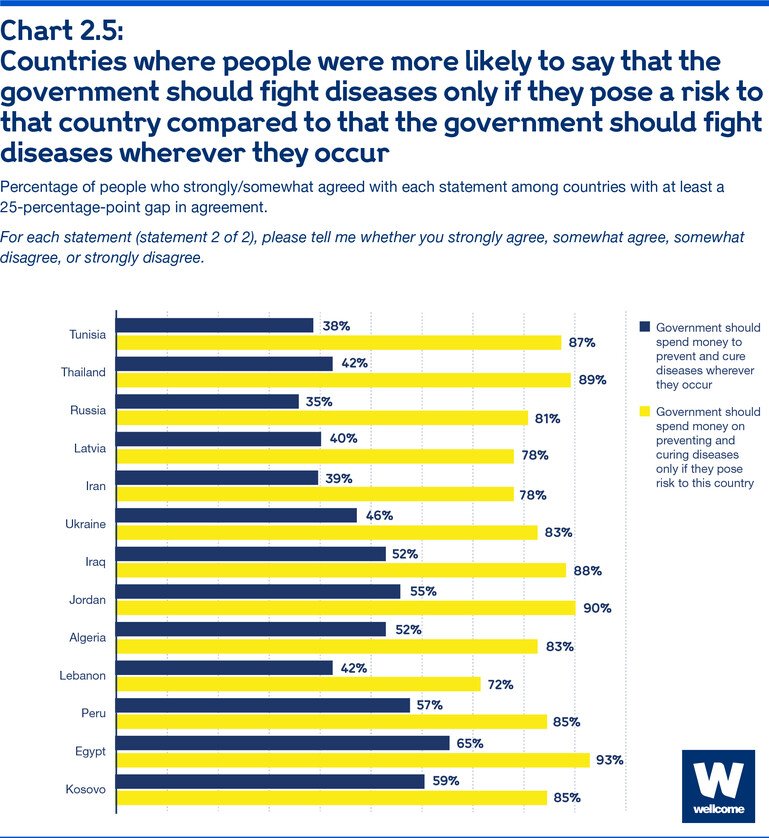
Endnotes
- Cousens, E., & Szabó de Carvalho, I. (2020, September 22). Why we need international cooperation now more than ever. World Economic Forum. https://www.weforum.org/agenda/2020/09/global-cooperation-international-united-nations-covid-19-climate-change/
- The G20 works on financing preparedness and response to future health challenges. (2021, May 15). G20. https://www.g20.org/the-g20-works-on-financing-preparedness-and-response-to-future-health-challenges.html
- Development finance data. (n.d.). OECD. https://www.oecd.org/dac/financing-sustainable-development/development-finance-data/
- UN/DESA Policy Brief #83: Recovering from Covid-19: The importance of investing in global public goods for health. (2020, July 17). U.N. Department of Economic and Social Affairs. https://www.un.org/development/desa/dpad/publication/un-desa-policy-brief-83-recovering-from-Covid-19-the-importance-of-investing-in-global-public-goods-for-health/
- Alonso, J. A., Glennie, J., & Sumner, A. (2014, July). Recipients and contributors: Middle income countries and the future of development cooperation [DESA Working Paper No. 135]. United Nations Department of Economic & Social Affairs. https://www.un.org/en/file/71254/download?token=eIZtDL-C
- Evans, A.(2013, December 27). Middle-income countries to have the casting vote on future of development. The Guardian. https://www.theguardian.com/global-development/poverty-matters/2013/dec/27/middle-income-countries-future-of-development
- G20 High Level Independent Panelon Financing the Global Commons for Pandemic Preparedness and Response. (2021). A Global deal for our pandemic age. https://pandemic-financing.org/report/
- UN/DESA Policy Brief #83: Recovering from Covid-19: The importance of investing in global public goods for health. (2020, July 17). U.N. Department of Economic and Social Affairs. https://www.un.org/development/desa/dpad/publication/un-desa-policy-brief-83-recovering-from-Covid-19-the-importance-of-investing-in-global-public-goods-for-health/
